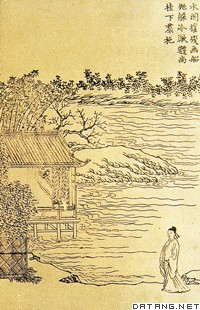1) translations of The Peony Pavilion


《牡丹亭》翻译
1.
This thesis is a comparative study of the three translations of The Peony Pavilion by Ciril Birch, Wang Rongpei and Zhang Guangqian.
文章同时指出《牡丹亭》翻译涉及“异化”与“归化”的策略问题,试图跳出直译、意译的局限分析翻译对策。
2) On the Peony Pavilion translated by Wang Rongpei


谈汪译《牡丹亭》
3) three English versions of The Peony Pavilion


《牡丹亭》三个英译本
4) Peony Pavilion


《牡丹亭》
1.
Conflict and Fusion of Affection and Ethic in Peony Pavilion;


《牡丹亭》情与理的冲突融合
2.
From Full-Length Play to Zhezi Xi:An Interpretation of Adaptations to Peony Pavilion from a Perspective of Communication;
从全本戏到折子戏——对《牡丹亭》改编的传播学解读
5) The Peony Pavilion


牡丹亭
1.
The Representational Strategy of the Emotion-Morality Conflict in The Peony Pavilion;


《牡丹亭》情理冲突的表现策略探析
2.
The Implication in The Peony Pavilion


《牡丹亭》的深层意蕴探析
6) The Peony Pavilion


《牡丹亭》
1.
Implied Messages in Key Dialogues in The Peony Pavilion;


探究《牡丹亭》经典段落中的潜台词
2.
Intelligent Person in Harem——On The Peony Pavilion and the Female Readers in Ming-Qing Dynasties;
“闺阁中多有解人”——《牡丹亭》与明清女读者
补充资料:《牡丹亭》
| 《牡丹亭》 中国明代传奇作品。汤显祖著。据话本《杜丽娘记》(《宝文堂书目》)改编。剧写少女杜丽娘,私出游园,在梦中与书生柳梦梅幽会,从此一病不起,怀春而逝。丽娘之父杜宝升官离任,在杜丽娘墓地造一梅花观。柳梦梅进京赴试,借宿观中,适在园内拾到杜丽娘的自画像,终于和画中人阴灵幽会。柳梦梅掘墓开棺,丽娘起死回生,结为夫妇,同往临安。时逢金兵入侵,杜宝在淮安被围,梦梅受丽娘之托前去禀报还魂喜讯,遂被杜宝囚禁。敌兵退去,柳梦梅以阶下囚一变而为状元,杜宝拒不承认女儿婚事,强迫离异。纠纷闹到皇帝面前,才得以圆满解决。 《牡丹亭》的感人力量 , 在于它洋溢着追求个人幸福、反对封建制度的浪漫主义理想。通过杜丽娘与柳梦梅的爱情婚姻,喊出了当时广大青年男女要求个性解放、要求爱情自由、婚姻自主的呼声,并且暴露了封建礼教对人们幸福生活和美好理想的摧残。《牡丹亭》在昆曲舞台上保持着历久不衰的魅力。有英、法、德、日等文字的译本。
|
说明:补充资料仅用于学习参考,请勿用于其它任何用途。
参考词条
